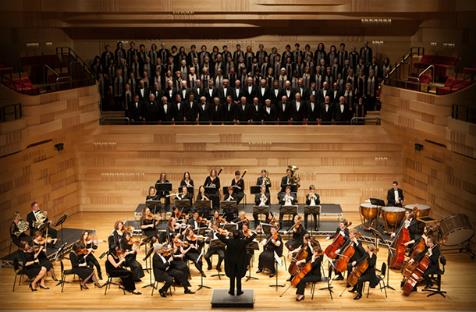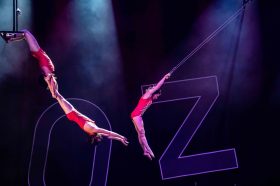Another glorious concert by the Willoughby Symphony Orchestra and Choir, this time under the umbrella title Love Stories.
Conductor Dr Nicholas Milton was assured and energetic and spearheaded a compelling and dramatic performance.
Performed roughly in chronological order of composition, first came the Tchaikovsky Romeo and Juliet fantasy overture. In five short sections the 1880 final revised version sees the fugal development section compressed and the dramatic B major chords supplementing the closing transformation of the ‘love’ theme. Based on Shakespeare’s play, the work is vividly multilayered and textured, with sweeping strings and lietmotifs for particular characters or sections of the plot (e.g. Friar Laurence and the deadly fights and squabbles). Listening carefully you can pick up hints of his Swan Lake and Fifth Symphony, and how they are contrasted and interwoven with the lyrical ‘love’ theme. Toward the end there is a slow steady drumbeat and march, quite chilling (Juliet’s funeral?) which leads to the passionate dramatic finale.
Just one example of the mid-Victorian craze for all things Scottish was the short middle work, Bruch’s Scottish Fantasy Op 46 (1879-80) featuring special guest artist Natsuko Yoshimoto on violin (a 1650 Amati). Yoshimoto wore a beautiful blue off-the-shoulder evening dress .Her playing was lyrical, luminous and exquisite. Bruch never actually visited Scotland but his work invokes the sound of rocks against waves, a Celtic harp sound and even the drone of a bagpipe.
The work, in four movements, is based on various Scottish songs and dances. (The first movement is based on ‘Auld Rob Morris’, the second includes ‘The Dusty Miller’, the third ‘I’m a Daun for Lack o’ Johnnie’ and the final is the unofficial national anthem, ‘Scots Wha Hae’). It ranges in mood from jaunty and exuberant to plaintive and melancholy (especially, for example, in the soaring, ravishing third movement) but changes to exuberant for the end.
After interval came the amazing Rachmaninoff The Bells (Kokoloka) from 1913, a huge choral symphony based on the poem by Edgar Allan Poe. There was a far more contemporary sound and feel to this work, I thought. Legend has it that Rachmaninoff wrote it using a desk Tchaikovsky had owned and there are references to the latter’s Pathetique Symphony as well as Mahler’s Fourth.
Rachmaninoff’s work is divided into four sections (‘Allegro ma non tanto – the silver sleigh bells’, ‘Lento – the mellow wedding bells’, ‘Presto – the loud alarum bells’ and ‘Lento lugubre, the mournful iron bells’). It can be read perhaps as an allegory of life. The bells conjured up are of various shapes, sizes and moods. The three soloists (Elli Bortolotti, Marcus Bortolotti and David Hidden) were excellent. In the first movement we had Marcus as a young man rapturously singing about the silver sleigh bells. You could almost see the snowflakes falling. In the second section (the mellow wedding bells), soprano Elli was soaring and passionate, singing about love and pain. The third section features a choir (the WSO Choir was magnificent). There is an almost overwhelming, tumultuous, crashing wall of sound as they scurry to an emergency. The breathless pace of this section is dramatically concluded by Dr Milton with his arm up, fashioning dead silence.
Bass David Hidden gave a superb, chilling performance as the demented bell ringer in the fourth final section (mournful iron bells); it gave one shivers. One can possibly pick up hints of Tchaikovsky’s ‘Queen of Spades’ in this section.
A most thrilling, passionate concert. ‘If music be the food of love, play on …’
Rating: 4 stars out of 5
Love Stories
Willoughby Symphony Orchestra
Conductor Dr Nicholas Milton
Tchaikovsky – Romeo and Juliet Fantasy overture 1880 (final version )
Bruch – Scottish Fantasy, Op.46
Rachmaninov – The Bells ( Kokola ) Op 35
The Concourse, Chatswood
15 – 16 June





